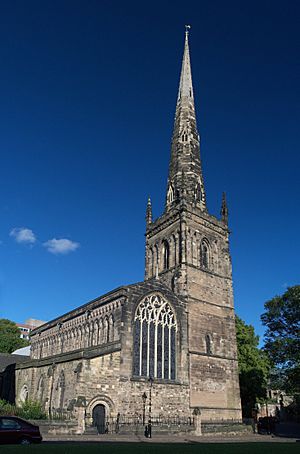William Bickerstaffe facts for kids

William Bickerstaff (baptised 18 August 1728 – 26 January 1789) was an English man who loved history, worked in a church, and taught at a school. He was well-known in his home county of Leicestershire. People remembered him for his good humor and kindness. Some of his letters were even printed after he died because they were seen as interesting and old-fashioned. William Bickerstaff was also known for his strong interest in local history. He wrote articles and letters to other history lovers about his discoveries.
Early Life of William Bickerstaff
William Bickerstaff was born in August 1728. He was baptised at the Church of St Mary de Castro, Leicester on August 18, 1728. He was the third child and only son of William Bickerstaffe, who was a glassmaker and a freeman of the city. His mother was Hannah.
On December 29, 1749, William followed in his father's footsteps. He became a freeman of the city of Leicester. This meant he had special rights and privileges as a citizen.
His Career in Church and Education
On January 30, 1750, William Bickerstaff became an Under-Usher. This was a type of schoolmaster at the local Free Grammar School. He helped teach students there.
Later, on December 23, 1770, he became a deacon in the church. This meant he could perform some church duties. In the same year, he started working as a curate at Syston. A curate is a priest who helps the main priest in a church.
The next year, on December 22, he became a full priest. He worked as a curate for seven years at the Church of St Mary de Castro. After that, he was a curate for six years at All Saints Church, Leicester. His obituary, a notice after his death, said he worked at "most of the churches in his native town." He also helped in nearby areas like Aylestone and Wigston Magna.
As he got older, William Bickerstaff faced money problems. He wrote many letters asking for better jobs in churches that became available. He hoped to get a promotion. Sadly, he never received a promotion during his lifetime.
After he died, his case for promotion was even brought before a judge. The judge said that William would have been promoted for his hard work if he hadn't died suddenly. His letters were printed in a magazine and a history book. People found them interesting because of their unique style.
William Bickerstaff's Character and Death
William Bickerstaff was known as a kind and funny man in the areas where he worked. He helped support Sunday schools in Leicester and Aylestone. He gave his time and money, even though he described himself as "a poor curate" with little money. He lived mostly on his small schoolmaster's salary and his curate's wage.
He also used his limited medical knowledge to help sick people in his parishes. He gave any extra money he had to local charities. People wrote down funny stories about him. One story tells how a church clerk was tricked into singing a popular folk song instead of a hymn!
William Bickerstaff was also a very educated man and loved history. Most of his writings are about historical research. He wrote many articles for The Gentleman's Magazine. He also sent letters to other history experts. One of these experts, John Nichols, later used Bickerstaff's knowledge of local history in his own book about Leicester.
On January 26, 1789, William Bickerstaff died suddenly in his sleep. He was sixty-one years old. People said he was in good health the day before. His obituary said he died "without a struggle or a groan," just as he had wished.
He was buried three days later, on January 29. His grave is in the churchyard of St Mary de Castro, next to his parents and two sisters. After his death, a notice was published in The Gentleman's Magazine. It included some of his letters. A poem on his monument at St Mary's describes his life:
No noisy vain applause, no dazzling blaze!
Mark'd the progression of his quiet days:
Yet let this monumental tablet tell
That praise, which living he deserv'd so well;
His joys were, Nature’s sorrows to relieve,
He gave the needy all he had to give.
To classic lore he led the mind of youth,
And taught to all the heav'nly paths of truth.
His humble life with great examples fraught –
Himself the mirror of the truths he taught.
If, Reader, one more perfect you would know,
Trace him in Heaven – such are not here below!
 | Valerie Thomas |
 | Frederick McKinley Jones |
 | George Edward Alcorn Jr. |
 | Thomas Mensah |

